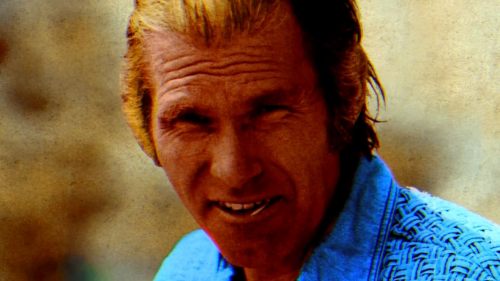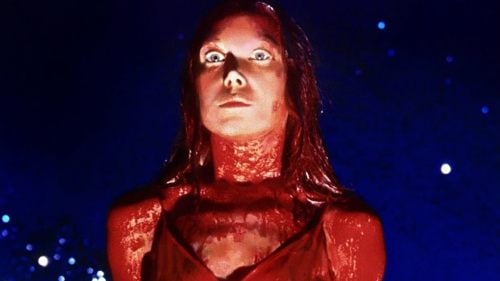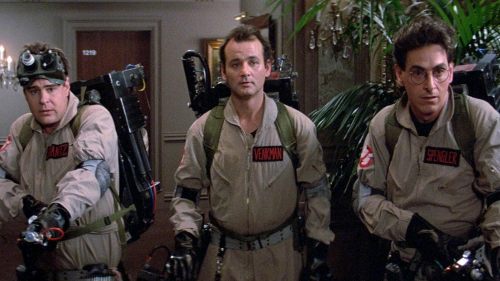Collins’ Crypt: Phantom Out Of The Opera
Few things annoy me more than people who instantly hate on a movie based on a book (or comic, or board game) for making changes to its source material. Sure, occasionally the opposition has some merit - the recent Spider-Man films have zero understanding of the Spidey character that's existed for 50 years, but even that would be acceptable if they made a good case for the changes they made (they don't, at all, which is why it's a bad change). The goal of a movie is to make a movie, not recreate a book to the letter - as long as whatever changes they make result in a good movie, what does it matter? Then you have two entertaining versions of the same story!
I bring it up because I realized some time ago that I never enjoy the Phantom of the Opera story unless it's being overhauled significantly. I've seen several "straight" versions of the tale (including the 1925 and 1943 ones from Universal, Hammer's 1962 production, and the 2004 Schumacher one that adapted the stage musical) and none of them really won me over - I might like one particular aspect of one over the others (Herbert Lom - great Phantom!) but none of them are movies I'd want to own or watch again. Some I downright loathe, such as Argento's 1998 version which I consider to be his worst movie - a tall order given the majority of his output since. And I've never read the Gaston Leroux novel so it's not some subconscious hatred of whatever things they changed rearing its ugly head, or even a preference of one version clouding my judgment on the others. The story as filmed, simply doesn't work for me, and by now I have to assume it's not just a half dozen filmmakers botching the job - there's something inherent to his story that keeps me at bay.
However, if a filmmaker takes the core concept and applies it to another setting, changing all of the details beyond "a guy haunts a place and kills everyone who stands between him and the object of his affection", I tend to like it quite a bit. Such is the case with Brian De Palma's Phantom of the Paradise, a new edition of which hits Blu-ray today courtesy of Scream Factory. I first saw the film in 2007 at the New Beverly, courtesy of an Edgar Wright programming festival, and I was pretty blown away by it. It's not quite like anything else in De Palma's filmography (though there is a split screen segment, and of course William Finley is in the cast), and that's a shame as I'd love to see him tackle such a crazy, genre-mixing tale again. It's a horror film! It's a comedy! It's a musical! It's a metaphor for the creative meddling that goes on when trying to make a movie!
The Opera connections are pretty obvious; Finley's hero Winslow is composing a song called "Faust" (the opera being performed in most traditional versions of Leroux's tale), his mask is used to cover his disfigured face, and there's a love triangle between him, the heroine (Jessica Harper's Phoenix), and another man (Paul Williams' Swan here, who is also the film's villain unlike the more heroic Raoul). And of course, he hides above the crowds at a theater, though instead of an opera house it's the titular Paradise, a more traditional rock club. He wants to see his beloved become a star, and in place of the chandelier scene is a fantastic setpiece where the Phantom kills Beef, a horrible glam rock star, with a giant neon electric bolt.
The biggest change to the Opera structure is that we start with Winslow (in place of Erik) as a normal guy, showing the tragic turns that lead to his disfigurement and birth of the Phantom. In fact the movie's about half over by the time he's in full Phantom mode, as there's a lot of backstory to get him to that point - he has his music stolen, he fights to reclaim it, meets Phoenix, goes to jail, escapes from jail... I can't help but wonder if the film's original box office fortunes would have improved if De Palma had presented some of this stuff as flashback, getting us to the titular Phantom quicker. It's equally entertaining in the meantime, but it probably threw first-time viewers for a loop.
Luckily the songs are good enough to almost not even notice that there's no Phantom (or Paradise) until the 40 minute mark. Winslow's "Faust" is an insanely good ballad, as is the later "Old Souls", and part of the genius of the movie is that we hear these songs performed in several different ways, as the evil Swan changes the music but uses his words for intentionally horrible pop and glam rock songs. Someone on Twitter, I believe one of the writers from The Dissolve (can't find the tweet now, may have been deleted for whatever reason) pointed out something interesting last week; that Edgar Wright's championing of the film (he recently hosted another screening of it in LA) is somewhat ironic when seen through the lens of the recent Ant-Man debacle. Like Winslow, he's been shown the door on a passion project, and will likely have to endure seeing some of his ideas filtered through 3rd parties with no regard for how much those things mean to him. I assume Wright won't don a mask and start haunting the stages at Pinewood Atlanta, but I also assume that if someone were to make that into a movie I'd probably like it a lot.
Paradise was not the first movie that used the skeleton of the Opera story and retrofitted for a new setting, however; the previous year's Wicked, Wicked was a hotel-set, exploitative version, where this take on the Phantom specifically targets blond women. However it actually uses the original organ score for the 1925 silent version, cementing its reputation as the first "It's Phantom of the Opera, but _____" (at least, it was the first I could find; if you know of an older one, let me know!). Interestingly, the entire film uses a split-screen effect (marketed as Duo-Vision), something De Palma was a big fan of for select sequences (he used it on the same year's Sisters). Phantom of the Paradise only uses the technique briefly compared to some of his other films, but it's interesting that the one and only movie to do it the entire time was also a Phantom "remake" and released before his own take.
And a few months before Paradise's theatrical release, the TV movie The Phantom of Hollywood aired. This one was even looser, but still was clearly inspired by Leroux with its tale of a masked man haunting a stage - this time that of a declining movie studio. But instead of "protecting" an actress he loves dearly, he's committing his murders for the sake of Hollywood itself, as the studio has decided to destroy its old sets and props (its HISTORY, mannnn) and thus he kills whoever attempts to do that. More of a slasher whodunit than a tragic romantic/horror blend, it nevertheless makes the same sort of attempt to fit Leroux's old engine into a new car.
Kiss Meets The Phantom of the Park was another TV movie, pitting the band against a mad villain that holds a grudge against them for some reason. When he is fired from the amusement park where he works (the same one where Kiss will be holding their concert) he vows revenge, planning to replace the band with robots and kill the fans during the concert. This is probably the flimsiest "adaptation" in the article, and widely considered to be one of the worst movies ever made, but by including it I am able to avoid some wiseass saying "You forgot Kiss Meets The Phantom of the Park!" in the comments. So there.
Earlier I mentioned Argento's "faithful" version of the Phantom of the Opera story being my least favorite of his films - but when I saw his 1987 film Opera I was quite impressed, and it remains one of my favorite entries in Argento's filmography. At first it seems like a modern retelling, with our heroine getting a big break after a rival actress is forced out of a major production, but it quickly spins into a more traditional Argento giallo, with incredible setpieces, gory murders, and a wacko ending. It's barely recognizable as a Phantom story by the end, but it's clear that it was an inspiration, and makes the failure of his later film all the more damning.
In 1989, cinema would be blessed with, if nothing else, the best titled entry for this column: Phantom of the Mall: Eric's Revenge. As with Argento's Opera it's more of a slasher movie than anything, but I was quite charmed with its application of the Leroux story. Unlike many of the other films here, Eric is a legitimately tragic character - he was immolated by greedy land developers who wanted to bulldoze his house in order to make way for the titular mall. And like the original story we don't know of the tragedy at first; it's revealed later (but often explained in any plot synopsis), starting the film off in traditional body count fashion before letting the pieces fall into place. In addition to being a reasonably entertaining late 80s slasher (as I've pointed out several times, by this point most slashers were pretty bland, even downright terrible), it also offers a pre-fame Pauly Shore and not one but TWO future Melrose Place residents: Rob Estes and Kelly Rutherford. It was also shot at the Sherman Oaks Galleria, home to many an 80s/early 90s production (including the incredible Chopping Mall!) before being mostly overhauled - it's pretty unrecognizable today outside of the parking garage and the elevator (which now leads up to the Arclight cinema).
That same year, Dwight Little followed up Halloween 4 (one of those other rare good late 80s slashers) with a somewhat traditional Phantom of the Opera, but with two hooks that separate it from the others. One is that the Phantom was played by Robert Englund, cast at the height of Freddy's popularity (the less popular 5th Elm St film had tanked a few months before this one was released, which probably didn't help marketing any), which means seeing the scars under the mask was more of a draw to viewers than normal. The other was a time travel framing device, it starts in the modern day with a young New York actress looking for her big break, only to be transported back to the 19th century after hitting her head. From there on it's no more or less faithful to the story than the average production, albeit with more gory murders and a couple of one-liners. Also, there is no chandelier sequence, a rarity for a Phantom production but it makes sense when you consider the movie was produced by Menahem Golan, the penny pinchingest producer who ever penny pinched. Scream Factory just announced a special edition of this one is forthcoming; I'm curious to see how it holds up.
With none of these films being particularly successful at the box office, it's not hard to understand why this sub-sub-genre never caught on. Since then there have only been a few, such as a kids' movie called Phantom of the Megaplex (a movie theater version where the "Phantom" merely causes mischief) and Erik: Portrait of a Living Corpse, a 2010 no-budgeter that is supposedly pretty faithful to the story but confusingly has a different title. And I'm sure there are dozens of other movies/TV shows that used some variation on the story (not to mention the unmasking scene from the 1925 version, which has been spoofed innumerable times), but I'm sure the comments pointing out the ones I missed will be in no way dickish. That said, even if I've failed to list every single example in existence (because if anything my columns are just too damn short) the point is still clear: there's something about this tale that makes it attractive to filmmakers wanting to do their own spin on it, and I can't help but wonder if they have the same feeling I do about the original. Maybe Leroux's story NEEDS to be modified in order to work (it was originally published in installments, it should be noted), and thus the more a filmmaker makes it his or her own, the better off they'll be.
(Phantom of the Paradise's Blu-ray is filled with so many extras that, for the first time, Scream Factory has been forced to spill some over onto a second (DVD) disc. I didn't even have time to go through them all, but the new, lengthy interviews with De Palma and Williams alone make it a must-buy if you're a fan.)



